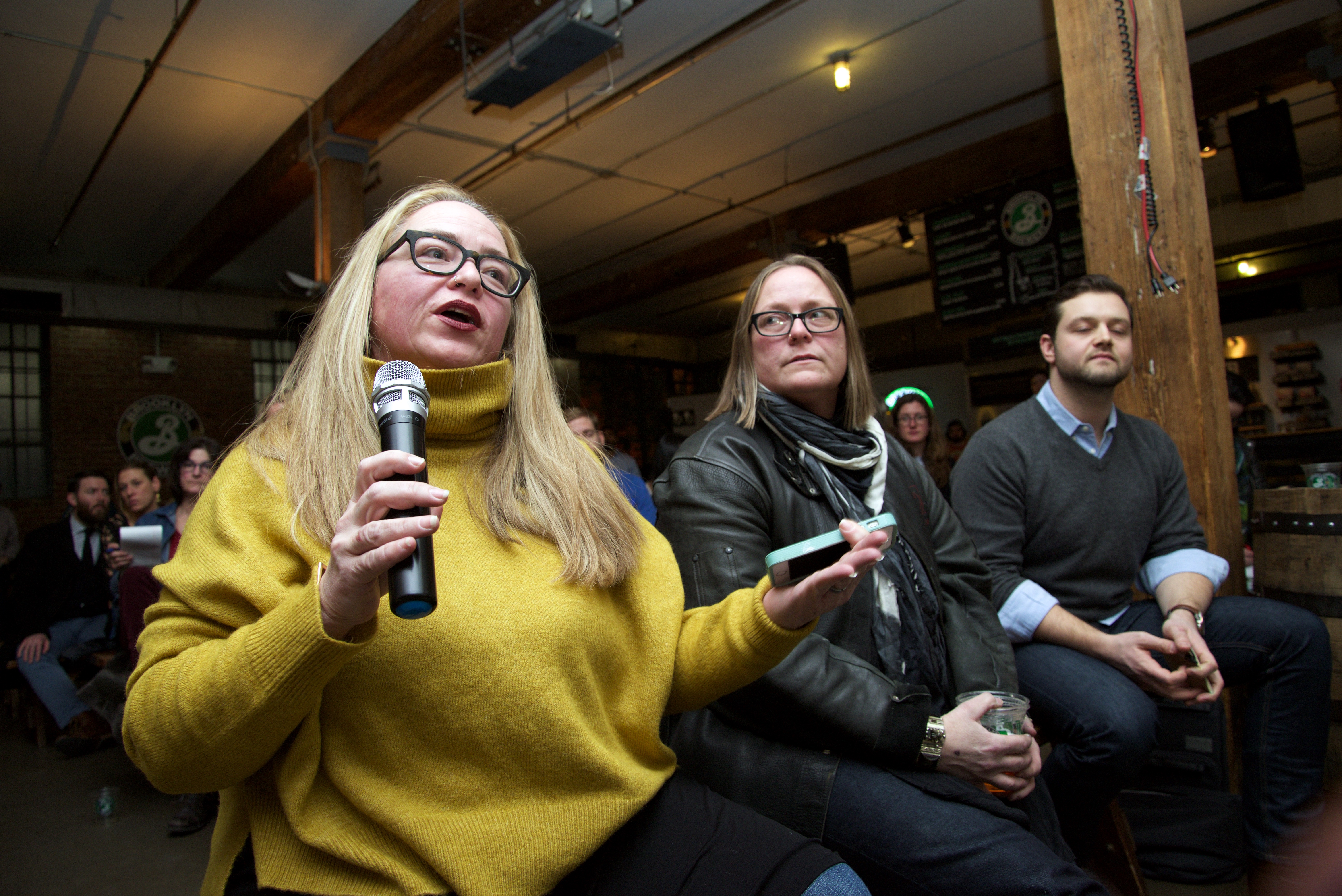One of the biggest challenges faced by up-and-coming local food producers is how to sell their products. Building relationships with local retailers is hard work, but it’s a key step in getting your company off the ground. To help answer questions about how one gets—and keeps—their product on store shelves, we hosted a “How To Pitch a Product” discussion on March 2 at the Brooklyn Brewery. We invited local retailers to join the conversation, including Gizella Otterson of BKLYN Larder, Sara Dima and Ilene Rosen of R&D Foods, Elly Truesdell of Whole Foods, Laura Heifetz of The Greene Grape and Pamela Brewer of Stinky BKLYN. Our own digital editor Ariel Lauren Wilson moderated.
Each specialty retailer obviously has its own specific needs when it comes to stocking, but each retailer generally agreed that the items they want are unique, many being things they enjoy themselves. And to evaluate that, you have to remember what was arguably the most important piece of advice from the evening: “People in the food business eat samples.” Dima stressed that including good samples “will make you and your product memorable.”
Thanks @EdibleBrooklyn and all awesome panelists for the insightful discussion at @BrooklynBrewery #EdibleBKBrewery pic.twitter.com/1cmhZl9n2m
— Yu Bakery (@YuBakery) March 3, 2016
Truesdell, who serves as Whole Foods’ Northeast region local forager, urges producers to not feel intimidated when pitching to larger retailers. Her job is basically to seek out small producers and stock their products at nearby stores, overseeing a key aspect of the company’s relationship with its neighbors and customers in the process. In fact, many small-batch producers often begin their relationship with Whole Foods by selling to a single store, before maybe branching out regionally.

When they aren’t being pitched, retailers tend to find new products at trade shows, local shopping (they often frequent each other’s stores), social media and by traveling. Otterson noted that she has found some of her favorite Bklyn Larder products while vacationing.
For most specialty retailers, previous product placement at supermarkets is enough to end any negotiation, although Truesdell does regularly stock products available at smaller retailers.
Bitters, jerky, jam, pickles, hot sauce, flavored salt. #slampoetry product needs from @RDFoods #EdibleBKBrewery
— Edible Manhattan (@EdibleManhattan) March 3, 2016
Once a relationship is established, retailers can provide vital assistance to producers on how to tweak their products to make them more appealing, especially when it comes to packaging. Truesdell works with potential suppliers to ensure that labeling standards are met, something that’s especially important given the breadth of Whole Foods’ customer base, many of whom actively seek out items that are certified USDA Organic and Non GMO Project-verified (she had to stop one producer from using his own made-up “certification” label). Heifetz also had to consult with an unnamed supplier to make sure the separate vegan and non-vegan versions of their product were clearly marked.

Certain categories of food have also reached, or are at least close to, market saturation according to Heifetz. While there currently isn’t any shortage of artisanal hot sauces, granolas and yogurts, she’s personally looking for someone to produce a high-quality packaged soup. Frozen items can be difficult, given that many places have limited freezer space (Heifetz has only one freezer, which is devoted mostly to ice cream), but Brewer urges producers to “consider how the customer will cook” any item they create. When it comes to ice cream and gelato specifically, Dima and Rosen suggest that producers start with three flavors, with the potential to expand to seven.
trade shows, local shopping, travel, and in person meetings are the top ways our panelists find new products to feature #EdibleBKBrewery
— Edible Brooklyn (@EdibleBrooklyn) March 3, 2016
Ultimately, Stinky Bklyn and Bklyn Larder are especially concerned with providing a product that will hook customers in and will have them coming back for more. Brewer says they actively look for an “impulse buy factor” and “crave-ability” while Otterson made it very clear that “We sell full-fat things. We’re not interested in gluten-free, paleo, sugar-free—I just want delicious.”
Interested in our next $10 event at the Brooklyn Brewery? Check out “How to Eat Cheese” coming up on April 6.



